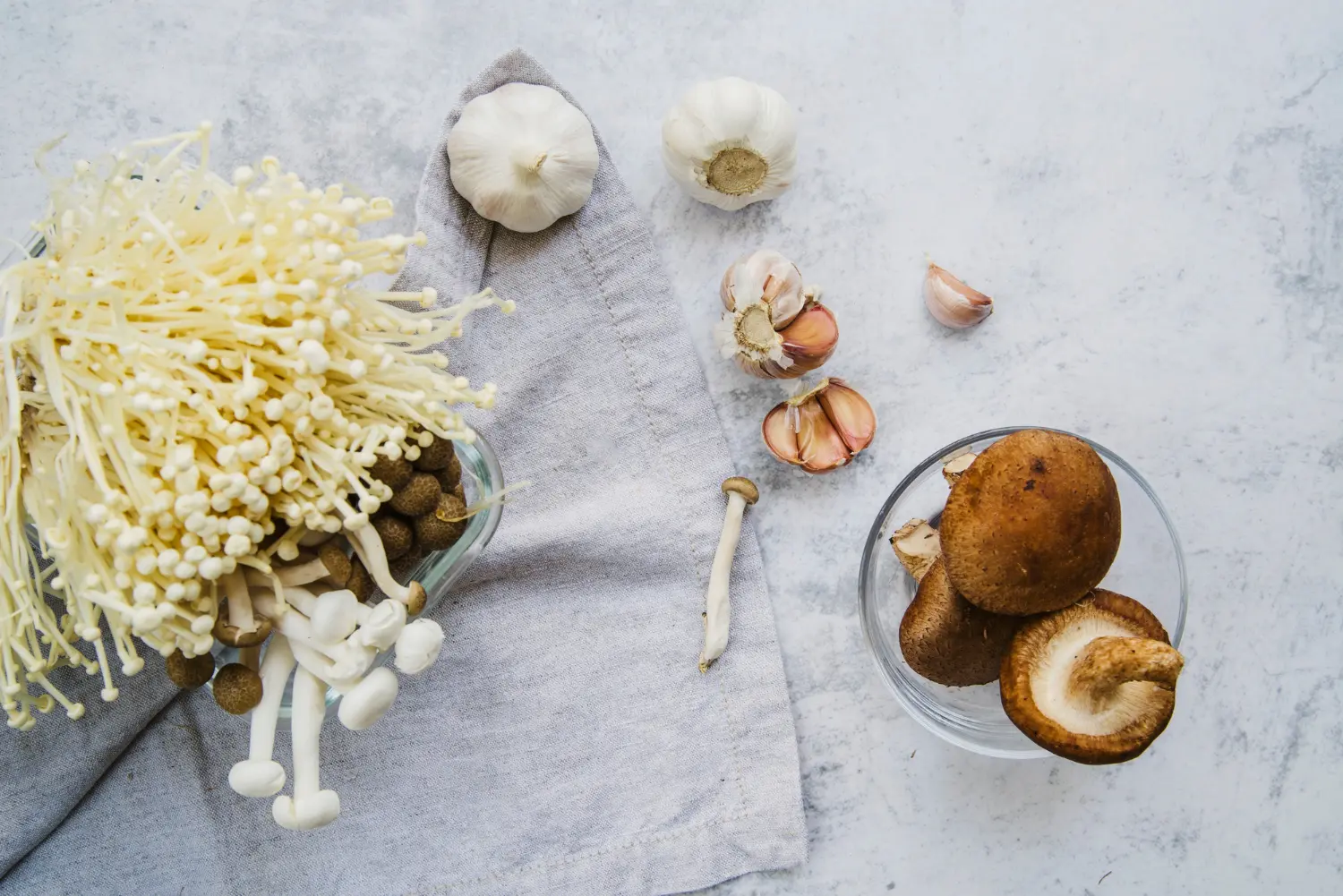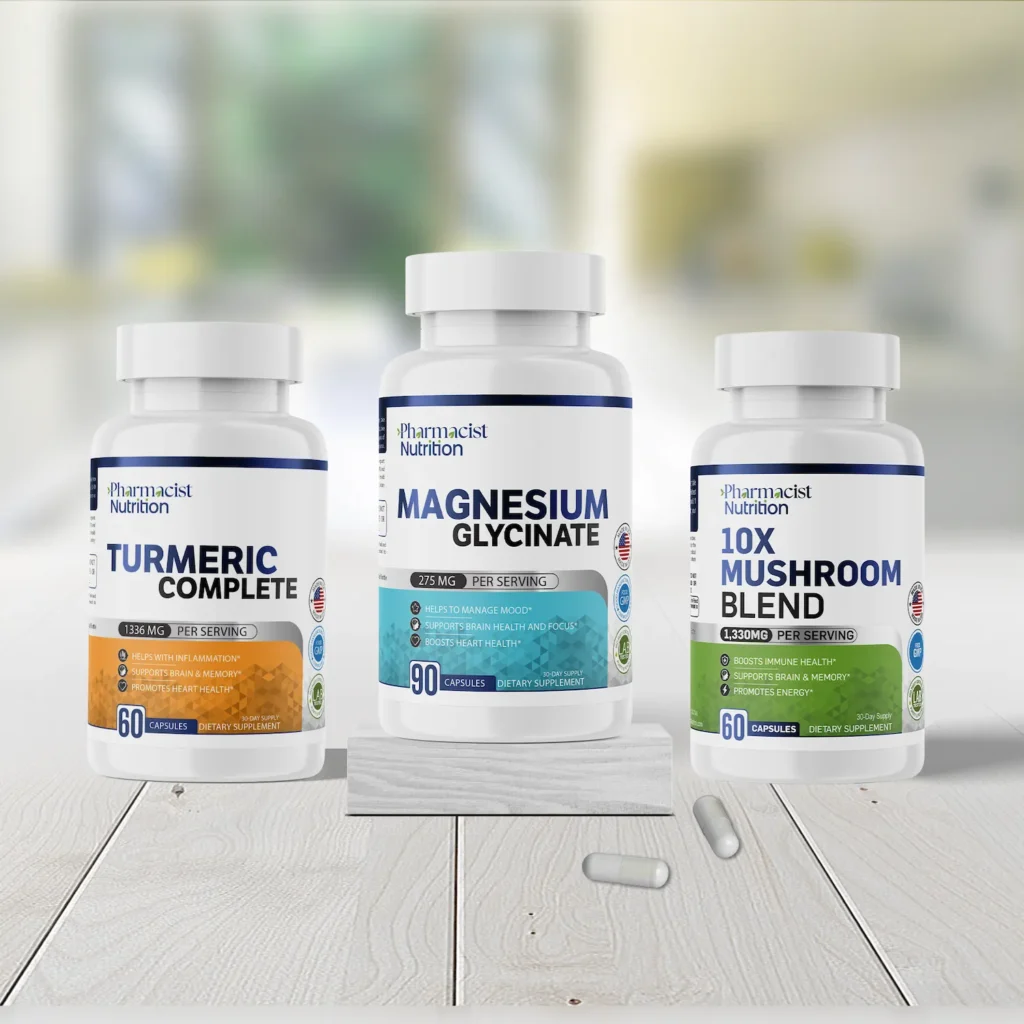
Lion’s Mane mushrooms, also known as Hericium erinaceus, isn’t your ordinary mushroom. Now picture this: a mass of cascading white tendrils resembling a lion’s mane, hence the name. Visually eye catching, sure, but what’s so appealing about them goes much further than the way they look.
What makes Lion’s Mane truly special is its potential to boost brain health. Now, is there a science to it? Yes, there’s a science to it. These mushrooms contain compounds called hericenones and erinacines, which have been studied for their neuroprotective properties and are unique specifically to Lion’s Mane.
They stimulate the production of nerve growth factor (NGF), a protein vital for the growth and maintenance of neurons. In simpler terms, Lion’s Mane may help with your cognitive function which includes your memory, learning capabilities, your attention span, decision making, and your language capabilities. Basically your overall brain health. Aside from that, Lion’s Mane also packs a nutritional punch.
It’s rich in antioxidants, vitamins, and minerals, making it a valuable addition to any diet. Plus, it’s been linked to other potential health benefits like reducing inflammation, supporting digestive health, and even boosting the immune system.
So, it’s not just another mushroom. It’s really taken hold of the spotlight lately due to unique benefits to the brain. And in a world where mental well-being is increasingly prioritized, that makes Lion’s Mane pretty special.
When you eat Lion’s Mane mushrooms, the bioactive compounds previously mentioned, hericenones and erinacines, have been shown to stimulate the production of NGF from either directly from neurons themselves or supporting cells in the brain like glial cells. NGF acts as a signaling molecule, binding to specific receptors on the surface of neurons and creates a domino effect inside of neurons that promote growth.
It promotes the proliferation and differentiation of neural stem cells into mature neurons. More simply, it tells stem cells in the brain to make more neurons. And these newly formed neurons then integrate into existing neural circuits like adding more roads to a highway in your brain, contributing to the expansion and plasticity of the brain’s neuronal network. (There’s more roads and routes to get from point A to point B)
Also, NGF plays a crucial role in the maintenance of existing neurons. It promotes the growth and branching of dendrites which are those long tails of a neuron, and by extending them, it’s easier for neurons to bounce messages from neuron to neuron.
NGF is also associated with neuroprotective effects by shielding neurons from various forms of damage and stress. It counteracts the harmful effects of oxidative stress, which occurs when there is an imbalance between the production of free radicals and the body’s antioxidant defenses. NGF also has anti-inflammatory properties, helping to mitigate inflammation-induced damage to neurons.
So putting these all together you’re “smarter” because your brain physically can work more efficiently.
I would typically prefer that you get nutrients from your food. Mushrooms typically aren’t used on a regular basis as most people wouldn’t eat mushrooms every single day so it does present an issue with the lack of consistency in the amount you’re getting if you’re expecting to get specific health benefits from them.
Luckily, if you chose to eat Lion’s Mane, it’s an extremely palatable mushroom, you can eat it just fine. It’s mildly sweet, it’s tender and it often times accompanies seafood because of that texture. You would definitely want to cook it down. Either sauté or grill it, it’s just important that it be cooked down because those cell walls of the mushrooms are very tough and would be difficult for our bodies to process if it wasn’t broken down.
In this instance, I would say absolutely, since we’re consuming mushrooms for a specific health benefit, like brain health, gut health, inflammation, and stress. It’s important to have consistency and to have proper doses of the substance, just like most medicines. Supplements provide us with a way to standardize the same amount of mushrooms and bioactives each and every day.
Luckily there’s lots of ways mushrooms come and it’s completely to your convenience. There’s mushroom tinctures which are concentrated extracts that you can take orally or mix with a drink. There’s powders that you can use to make “mushroom coffee” or matcha drinks which is nice if you’re used to having coffee every morning and you’re willing to replace it with a mushroom supplement.
And of course there’s the classic mushroom capsules. That’s my preference because of ease and speed. You don’t have to take the time to consume a whole beverage or you can just take them with the other medicines or supplements you were going to take anyway.
Of all the questions I get at the pharmacy regarding supplements, this is the most common question by far: “What’s the BEST one.”
And the answer is, it’s hard to say. Supplements in America aren’t FDA approved like how medicines are. But, the FDA does control the way these manufacturers process their ingredients and run their facilities so there are some certifications or qualities that you can look for to help you build a little more trust in the brands that you see.
You might see “GMP-Certified” which stands for Good Manufacturing Practice. So you know that the facility in which the product is produced is made consistently, the facility is clean, the packaging and labeling has everything that’s required, and that the product is what you expect it to be.
Products that indicate that they’ve been Third-Party tested which means that they sent their product to a company that is not associated with their own to test the quality of their product is another indicator that the product is pure, and is also what it’s suppose to be.
Finally, you might want to know where the ingredients comes from, in this case, where the mushrooms are grown. I personally prefer that my products have at least the final production in the US just because I’m more familiar with the quality assurance procedures we have in this country but there can be definite advantages to products sourced overseas in some instances. Now of all the questions I get at the pharmacy, this one should be up towards the top but it typically isn’t, and that’s…
Does Lion’s Manes Mushroom actually work? There are studies on it. There’s studies that show that introducing extracts of lion’s mane does increase the growth of neurons. There’s studies that show that administering lion’s mane mushrooms to mice actually improves cognitive function vs. a placebo or control group. There are studies that show the enlargement of the hippocampus, the memory part of your brain when lion’s mane was administered. There’s studies that show, in humans, an improvement in memory from trials that last anywhere between 3 and 12 months.
HOWEVER….
The best studies so far are:
1. In vitro which means outside of the body, typically in a test tube or petri dish where we can physically observe what’s happening or…
2. In animal studies, particularly mice, because of the high volume of test subjects. We like to test mice because of the anatomical similarities to humans. But they’re not humans.
So I would love, to have more human studies to verify the scope of effect lion’s mane has on the human body with different age groups, skill tests and demographics. I think that would be really beneficial.
But from what we know so far, it’s very promising, and I am extremely optimistic. I just want more data. Another question I get asked a lot is…
I wouldn’t be too worried, especially if the mushroom is fresh if you intend to eat it and the supplements are at the minimum, GMP-certified if you take it as a supplement. If you do have any pre-existing conditions I always do recommend you talk to your doctor or your local pharmacist regarding whether you can take the supplement or not, depending on your unique situation.
For instance, if you’re taking a supplement that coincides with diabetes and you’re taking a supplement that lowers blood sugar, you may be at risk for hypoglycemia or too low blood sugar. So that’s always something to consider. The last question I get is..
Which is a curious scenario to me because patients would come all the way to the pharmacy, fully intent to find the product but are still skeptical, which is good, but they have questions.
I would say with Lion’s Mane in particular, why not?
And when I say “why not” it always reminds me of when I was working towards my bachelors degree in chemical engineering as an undergrad and I wikipedia’d a lot of terms and one day it led me to scientist by the name of Blaise Pascal and despite being a scientist which typically relies completely on hard evidence to construct conclusions, one of his beliefs when given two possible outcomes was:
“You have everything to gain if you’re right, and very little to nothing to lose if you’re wrong.”
And of course, that’s horrible paraphrasing but it’s led me to say yes more often than saying no since then, if everything else has failed and/or there’s no real risk involved. He, in this instance is talking about the existence of God, and I’m talking about mushrooms. But, If you’re not all interested in the health benefits that it provides, it’s probably a pass.
If you are interested in preserving cognitive function over time (because prevention is easier than treatment in most cases) or improving cognitive function and brain health. I would give it a go.
I really appreciate, if you made it to the end of the article and if you have any questions at all, you can shoot us an email. If you enjoyed the content, please consider signing up for our mailing list at the bottom of the page and if you’re looking for more information on supplements you can always find more resources on our website.
(As Transcribe From Mini-Med Minutes Podcast) Welcome back everybody to another episode of Mini-Med Minutes and today we’re
(As Transcribe From Mini-Med Minutes Podcast) Welcome back everybody to another episode of Mini-Med Minutes. This
(As Transcribe From Mini-Med Minutes Podcast) Welcome back everybody to another episode of Mini-Med Minutes. I
(As Transcribe From Mini-Med Minutes Podcast) Welcome back everybody to another episode of Mini-Med Minutes.
(As Transcribe From Mini-Med Minutes Podcast) Welcome back to MINI-MED MINUTES The presidential election is on
(As Transcribe From Mini-Med Minutes Podcast) Welcome back to Mini-Med Minutes. And today… we’re going to

Join our community to receive:
Sign up now and take the first step towards a healthier you!